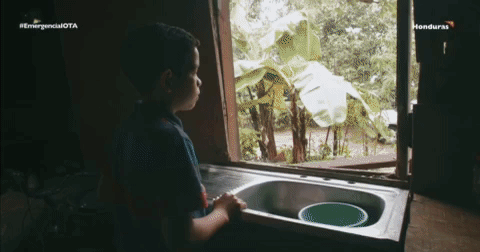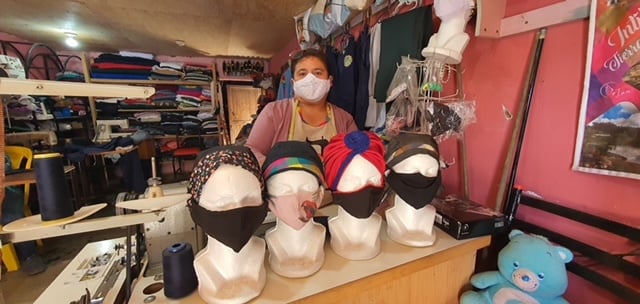Greetings!
World Vision is delighted to send you our Executive Briefing for Economic Empowerment. You are an integral part of our work to end extreme poverty by 2030, so we want to keep you updated on our progress! This edition is focused on our Recovery Lending for Resilience work in Honduras - a country that has been hit with economic shocks as a result of the COVID-19 pandemic as well as two devastating hurricanes this past winter.
Recovery Lending for Resilience: Honduras
The Need
While many of us in the U.S. are getting our COVID-19 vaccines and returning to some degree of normalcy, most of the world is still struggling to navigate the impacts of the pandemic. For many, "a return to normal" is years away.
The short-term health crisis of COVID-19 will be overshadowed by the long-term economic crisis that could last for years. The World Bank estimates that COVID-19 will push between 119 and 124 million people into poverty. This is the first global increase in poverty since 1998, and an "unprecedented" rate of increase (source).
VisionFund® Honduras' clients and Honduras THRIVE participants are in a particularly vulnerable situation. In Honduras, the COVID-19 related economic shocks have been compounded by back-to-back hurricanes, Iota and Eta (Nov. 2020). These emergencies affected 4.2 million people (43% of the national population) in Honduras, and increased the percentage of Hondurans living below the national poverty line by more than 11% (from 58.8% to 70%).

At the end of December 2020, 55.1% of VisionFund Honduras clients were living under the national poverty line, with 15% of clients living on a $ 1.25 dollars per day.
Our Response
In order to meet the increased needs of VisionFund's 18,449 clients in Honduras as well as participants in the THIRVE program, we are responding through the provision of Recovery Lending for Resilience, a financial lifeline that enables farmers and entrepreneurs to recapitalize and get back to business quickly as restrictions are lifted.
The Recovery Lending for Resilience program in Honduras includes lending capital, digitization and empowered worldview training. The rest of this newsletter will highlight an insurance innovation that is supporting this work, and share the story of a client who has adapted her business during this time of COVID-19 with the help of a recovery loan.
If you'd like to learn more about our global recovery lending for resilience program, you can read our first recovery lending for resilience report here.
If you or someone you know would like to donate to World Vision's Recovery Lending for Resilience work, please contact your representative or use this link.
ARDIS
As we talk about natural disasters, it's important to talk about disaster insurance. VisionFund’s innovative program ARDIS – the Africa Asia and Americas Resilience in Disaster Insurance Scheme – working in partnership with the German Development Bank’s InsuResilience Investment Fund and Global Parametrics, is the world’s largest non-governmental climate-insurance program.
ARDIS, established in 2018, is VisionFund's in-house scheme for supporting VisionFund's microfinance institutions in the event of a major natural or geo-hazard disaster. Its benefits our clients, who are unable to insure themselves against such risk, by ensuring our microfinance institutions are financially strong enough to provide the recovery loans they urgently need.
In essence, ARDIS puts capital back into our microfinance institutions during natural disaster related emergencies.
Fortunately, this was the first year VisionFund Honduras was covered under ARDIS. ARDIS covered VisionFund Honduras and its clients for windstorm and earthquake damage. Windstorm qualifications include rainfall, wind speed, and sea-surge. Under the ARDIS definition for windstorm, hurricanes Iota and Eta were deemed as a single event (meaning they happened within 10 days of each other) with a magnitude of 100+ year severity, triggering maximum benefits.
Such grants and loans benefit individuals and communities when credit is most needed and not available through normal channels. ARDIS helps restore livelihoods and reduce negative coping mechanisms for the clients. It also helps microfinance institutions mitigate growing loan portfolios, when shrinkage is the norm.
Learn more about ARDIS here.
A Recovery Lending Story: Liliam Maritza Arriaga
My name is Liliam Maritza Arriaga. I am 49 years old, married, I have four children, two of which still depend on me.
For 21 years I have dedicated myself to my tailoring business. However, my business has been seriously affected by the [government-mandated] COVID-19 closures. Because I had to close my business for several months, my income was damaged.
VisionFund Honduras supported me in that difficult time by including me in the temporary relief options that VisionFund granted. Even so, I could not recover financially and I was still unable to make payments to the loan.
VisionFund Honduras supported me again by granting me a loan for USD 1,225.00 as working capital for my business, which has once again boosted productivity to the point of leveling sales. The current situation inspired new ideas to help me increase revenue. I started manufacturing fabric mask and particulate material to meet the biosecurity requirements for my clients.

VisionFund has been understanding and they have supported me. This is why I have managed a relationship with them since 2012 with the desire to continue [taking loans from VisionFund] for a long time.
Newsflash
Earlier this month, the New York Times published an article linking the devastation of hurricanes Iota and Eta to an increase in migration from Honduras towards the U.S. border. The article writes:
Then last fall, two hurricanes hit impoverished areas of Honduras in rapid succession, striking more than four million people across the nation — nearly half the population — and leveling entire neighborhoods..."People aren’t migrating; they’re fleeing," said César Ramos, of the Mennonite Social Action Commission, a group providing aid to people affected by the storms. "These people have lost everything, even their hope."
For more information on Honduras, check out a recent segment from NPR, "Hurricanes, Pandemic and Falling Economy Prompt Honduras to Leave for the U.S."
World Vision and VisionFund are working to ensure our clients and the communities we serve are able to rebuild their livelihoods so that they don't need to emigrate. As you have conversations about the migration issue with your family, friends, and co-workers, please bring World Vision’s work into the conversation so people understand that we can successfully address the root causes of migration.
Praises & Prayer Requests
PRAISE
- Praise for our donors who support who have allowed us to deliver recovery loans during this time of need.
- Praise for innovations such as Recovery Lending and ARDIS, which provide resilience for our clients to withstand economic shocks.
PRAYER
- Pray for the Honduran people who are working to rebuild their livelihoods after a year of both economic and natural disaster.
- Pray our VisionFund Honduras staff have the wisdom they need to manage the challenges of operating during such difficult times.
- Pray that we're able to deliver the needed recovery lending assistance for VisionFund Honduras to meet the needs of our clients.